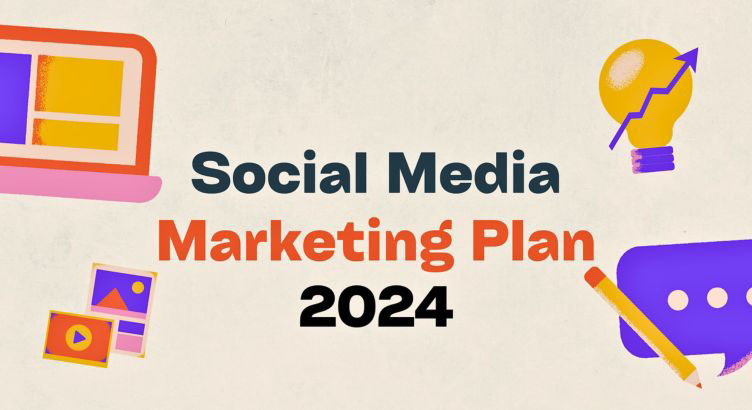In the ever-evolving digital marketing landscape, a well-structured social media marketing plan is no longer an option; it’s necessary. As a dynamic arena for brand visibility, consumer involvement, and lead creation, social media platforms have become vital to the success of organizations. In this article, we’ll delve into the critical components of a robust social media marketing plan , offering practical insights to boost your business’s online presence and overall success.
Creating a Foundation: Understanding the Importance of Social Media Marketing
Why Social Media Marketing Matters
Promoting a business on social media involves more than just publishing and sharing content. It’s an effective way to reach your demographic, raise your brand’s profile, and generate sales. Consumers seek out brands on social media platforms in today’s digital world, making a solid online presence imperative for businesses.
Social Media’s Effect on Purchasing Habits
To craft a winning marketing plan, it is essential to comprehend how social media influences customer behavior. Social media platforms influence purchasing decisions, with users relying on reviews, recommendations, and brand interactions to inform their choices. A well-executed social media marketing plan can position your brand as a trusted authority, influencing potential customers at every stage of the buyer’s journey.
Crafting Your Social Media Marketing Plan
Defining Your Objectives
A social media marketing plan can only get off the ground by establishing some objectives. Whether your marketing aim is to boost website traffic, brand recognition, or revenue, setting defined and measurable targets can keep you on track and help you achieve them.

Identifying Your Target Audience
You must know who you’re writing for if you want your material to resonate. Conduct in-depth research to determine your target audience’s demographics, interests, and internet habits. By analyzing your social media analytics , you may learn who engages with your material and adjust your approach appropriately.
Choosing the Right Social Media Platforms
Various social media sites have different strengths and weaknesses. Each platform serves a distinct audience and style of material. Selecting the right platforms for your business ensures you’re effectively reaching your target audience. For instance, visual-centric businesses may succeed on Instagram, while B2B companies might focus on LinkedIn.
Content Creation and Distribution
Social media marketing strategies that rely on captivating content will fail. Ensure your content calendar serves your company goals and the needs of your target audience. To keep your content interesting and varied, use a combination of text, photos, and videos. Also, use scheduling tools to ensure you post simultaneously every day.
Engagement and Community Building
Create a dedicated and enthusiastic following of brand advocates by bringing people together in a community. Participate in conversation with your followers by responding to comments, DMs, and online communities. Bring a personal touch to your business and foster stronger consumer interactions by encouraging user-generated content and establishing a two-way dialogue.
Monitoring and Analytics
Make consistent use of analytics to monitor the performance of your social media marketing initiatives. Monitor important indicators like engagement, conversion rates, and reach. Insights into what’s working and what needs adjusting are revealed by analyzing this data, enabling continual improvement.
Influencer Partnerships and Collaborations
In today’s digital age, influencer marketing has become a powerful tool. Nowadays, influencer marketing is an excellent way for brands to genuinely connect with their target audience. The power of social media marketing initiatives can be magnified by forming alliances with prominent figures in the industry. Explore how to identify the right influencers, establish partnerships, and leverage their reach to enhance brand visibility and engagement.
Paid Social Advertising Strategies
While organic content is essential, paid social advertising can significantly boost your social media marketing plan. Delve into the various paid advertising options available on platforms like Facebook, Instagram, Twitter, and LinkedIn. Master the art of advertising by learning how to reach your target demographic, track your return on investment (ROI), and fine-tune your ads for maximum conversions and success.
Optimizing Your Social Media Strategy for Success
Achieving success in reaching and engaging your target audience in the ever-changing world of digital communication requires improving your social media approach.
- Define Clear Objectives: Begin by establishing specific and measurable goals. Whether increasing brand awareness, driving website traffic, or boosting sales, having a clear objective will guide your strategy.
- Know Your Audience: Understand your target audience’s demographics, interests, and online behavior. Please get to know them better by creating material that speaks to their interests.
- Platform Selection: Identify the platforms where your audience is most active. Instead of spreading yourself too thin across all the platforms, concentrate on a few that matter. This will help you to engage in more targeted and valuable ways.
- Consistent Branding: Consistently represent your brand in all social media posts. Consistency in visuals, tone, and messaging builds brand recognition and trust.
- Content Quality over Quantity: Prioritize quality content that adds value to your audience. Content relevance and resonance are critical in informative articles, engaging visuals, or interactive polls.
- Engagement and Interactivity: Foster a two-way communication channel with your audience. Encourage user-generated material, respond quickly to comments, and ask questions to build community.
- Analytics and Adaptation: Regularly analyze social media metrics to gauge the performance of your strategy. Adapt based on the data, refining your approach for continuous improvement.
Add these tactics to your social media strategy to build a more substantial online presence, engage with your audience on a deeper level, and boost your brand’s or company’s success.
FAQs
1. Why is a social media marketing plan essential for business growth?
A well-structured social media marketing plan helps businesses reach a wider audience, build brand awareness, engage customers, and drive traffic, leading to increased sales and growth.
2. How can a business determine the right social media platforms for its marketing plan?
Identify your target audience and their preferred platforms, analyze competitors’ strategies, and consider the nature of your products or services. Pick the channels where your target demographic spends the most time.
3. What components should be included in a comprehensive social media marketing plan?
A well-thought-out social media marketing plan will have specific goals, a defined audience, a content strategy, a posting schedule, engagement strategies, and metrics to monitor performance.
4. How does consistency in posting content contribute to social media marketing success?
Consistent posting establishes brand reliability, engages the audience, and maintains user feed visibility. It promotes a unified brand image and helps build a dedicated fan base in cyberspace.
5. How can businesses leverage analytics to optimize their social media marketing plan?

Engagement, reach, and conversion rates should be regularly analyzed. Constantly up your social media marketing game using insights to fine-tune your approach, discover what material performs well, and make data-based decisions.
In this digital era, a social media marketing strategy that is both well-organized and executed can do wonders for your company. Realizing the value of social media marketing, defining your objectives, researching your demographic, and selecting the right platforms will allow you to craft a plan that resonates with your target audience and drives your business to success.
Remember to continuously optimize your approach through analytics, adopt a multi-channel strategy, consider paid advertising, and stay informed on industry trends. By following these steps, you’ll be well on your way to maximizing the potential of social media for your business.
Is your social media advertising strategy ready for a level-up? Explore elatre.com for expert guidance and solutions tailored to your business’s unique needs.



